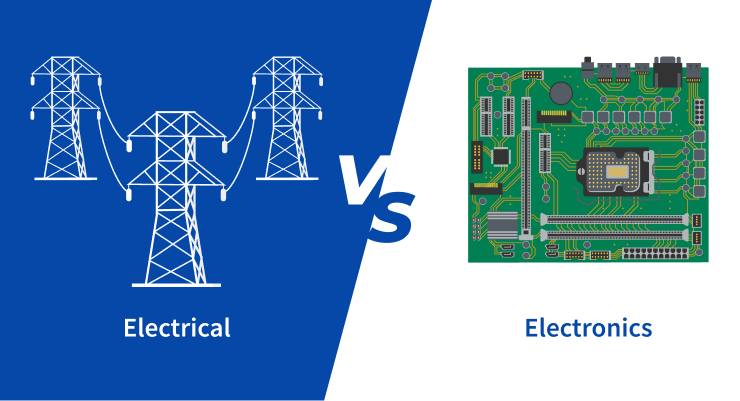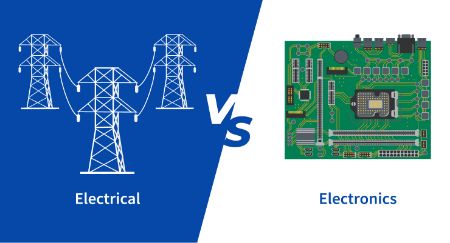Now, if you asked someone on the street this question their response would likely be that an electrical engineer deals with the wires in the walls of your house that power your lights, refrigerator, etc. On the other hand, they would probably say that an electronics engineer works with the wires in the computers that are inside of that house. Case closed.
And, unsurprisingly, that is not a great answer to our leading question. Most people use the terms electrical and electronics interchangeably due to their similarity, yet the responsibilities of an electrician are completely different. Hugely simplified, while electricians deal with wires in houses and businesses, electrical engineers deal with distribution and product development. Electrical engineering is a wide umbrella that includes many sub-topics, including electronics. Between electrical engineering and electronics engineering, you can think that electrical is big and electronics is small, but the differences are more nuanced. So, in the interest of making us all a bit more precise about this field of engineering, let’s discuss those.

What is Electrical Engineering?
Electrical engineering comprises the design and application of systems and devices that take an electrical current (electron flow in a conductor) and transform it into some other form of energy to perform a useful function, such as in a power plant, machinery, or a building wiring network. Electrical engineers frequently design larger systems and machinery with unique electrical requirements. Given this, electrical engineers need to know about the design and needs of power networks, electrical machinery, electrical energy distribution, radio frequency communications, systems and controls, and industrial controls.
What is Electronics Engineering?
Electronics engineering is the design of circuits and devices that use active, solid-state components (resistors, capacitors, transistors) to control current flow in a way that adds information to the current and performs a useful function. Electronics engineers typically design smaller electrical paths on circuit boards, linking support components and computer chips in equipment that manipulates or uses data to perform a necessary consumer or commercial function, like in computers or telecommunications equipment.
Thus, another way to briefly summarize the difference between electrical and electronics engineering is that a system which uses electricity merely as energy is electrical. If the system uses electricity as a way to manipulate information, then it is electronic. What leads to confusion in the use of the two terms is that all electronic devices are also electrical devices, just to a different degree. You can twist this statement by saying that all electronic engineering is electrical, but not all electrical engineering is electronic.
Electrical devices usually operate in the alternating current (AC) range, typically from 220V all the way up to the kilovolt (kV) range. Electronic devices usually operate with direct current (DC) range, in the microvolt to low voltage range.
Electrical vs. Electronic Comparison Table
Characteristic ELECTRICAL ELECTRONICS
Alternating Current X
Direct Current X X
Large Size X
Small Size X
High Current X
Low Current X
Controls Electricity X
Controls Information X
Note, that as a subdivision of electrical engineering, technically anything electronics engineering related can arguably be considered to be electrical engineering as well.
Do Electronics engineering and Electrical Engineering Overlap?
In a word, yes. At times, significantly. Engineers from both the electrical and electronic sides of the aisle typically collaborate on design projects and share related duties. The design and construction of a new computer chip, for example, may require an electronics engineer to layout the various components and circuit traces on the chip, while an electrical engineer might focus on the energy usage of the chip and the integration of it into a larger electrical system. They work together to evaluate existing products as well as propose and develop new ones.
Crossover can also occur when a digital microcontroller (electronic) in an industrial process control system, for example, is used to initiate a relay that governs the operation of a large, powerful motor (electric) that functions in a piece of machinery.
As modern products and systems grow ever more sophisticated and complicated, the lines between electronic and electrical become more and more ill-defined.
Training needs for Electronics vs Electrical Engineers
Given that electronics is a subset of electrical, the basics of electricity, current, voltage, etc, is necessary knowledge for any engineer, despite their title. Beyond the basics, electrical engineers also have to understand machinery, motors, electrical power systems, electrical distribution, interface devices (sensors), and electrical controls.
Electronics engineers must also understand the digital world, embedded systems, computer networking, microelectronics, and testing. They are also more reliant on design, test, and verification software tools to help them implement their ideas, although software solutions are growing in usage across all disciplines.
Our friends at CircuitBread.com have been working hard to deliver educational content on their platform for the growing community of electrical and electronics engineers. Their resources cover everything from fundamental principles to advanced concepts, ensuring that both aspiring and seasoned engineers can find valuable information to enhance their knowledge and skills. For those interested in reading more about the differences between electrical and electronics engineering, we highly recommend checking out their insightful blog titled What is the Difference Between Electrical versus Electronics Engineers?
Summary
The terms electrical and electronics engineering will continue to be used interchangeably until we have better descriptors. Suffice to say that, until then, it may be best to refrain from using the acronym “EE” when categorizing an engineer’s formal training or experience in the electrical area. In this case, the longer academic degree names are far more accurate.
contact us:
 EN
EN
 English
English
 Chinese
Chinese
 Italiano
Italiano
 Portuguese
Portuguese
 Deutschland
Deutschland
 French
French
 Russian
Russian
 Japanese
Japanese
 Turkish
Turkish
 Korean
Korean
 Spanish
Spanish
 my account & orders
my account & orders


